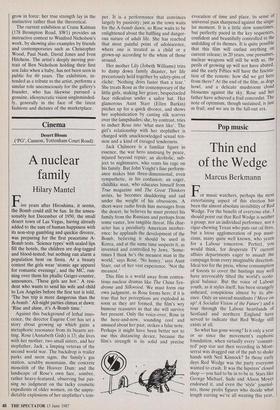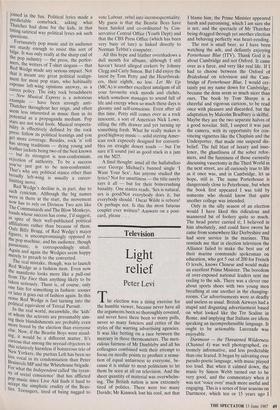Pop music
Thin end of the Wedge
Marcus Berkmann
For music watchers, perhaps the most entertaining aspect of this election has been the almost absolute invisibility of Red Wedge. For the benefit of everyone else, I should point out that Red Wedge is neither a group, nor an individual performer, nor a cigar-chewing Texan who puts out oil fires, but a loose agglomeration of pop musi- cians, many quite well known, who yearn for a Labour tomorrow. Perfect, you would think, for desperate TV current affairs departments eager to assault the campaign from every imaginable direction. Ideal too for the press, whose consumption of forests to cover the hustings may well have irrevocably tilted the world's ecolo- gical balance. But the voice of Labour youth, as it styles itself, has been strangely unheard, conspicious almost by its abs- ence. Only an unread manifesto (' Move on up! A Socialist Vision of the Future') and a tour through the Labour heartlands of Scotland and northern England have served to indicate that Red Wedge still exists at all.
So what has gone wrong? Is it only a year or so since the movement's euphoric foundation, when virtually every 'commit- ted' pop star not then recording in Mont- serrat was dragged out of the pub to shake hands with Neil Kinnock? In those early days Red Wedge was the party everyone wanted to crash. It was the hipsters' closed shop — you had to be in to be in. Stars like George Michael, Sade and Alison Moyet endorsed it, and even the 'style' journal- ists, those prolix figures who decide what length earring we're all wearing this year,
joined in the fun. Political lyrics made a predictable comeback, asking what Thatcher had done for the kids, in that biting satirical way political lyrics ask such questions.
Fortunately pop music and its audience are sturdy enough to resist this sort of bilge. It was only really at the sharp end of the pop industry — the press, the perfor- mers, the writers of T-shirt slogans — that Red Wedge made any serious impact. Not that it meant any great political realign- ment for most pop stars, who habitually espouse left-wing opinions anyway, as a career policy. The inky rock broadsheets — New Musical Express is a notorious example — have been strongly anti- Thatcher throughout her reign, and often seem less interested in music than in its potential as a propaganda medium. Pop stars are not total fools. Musical respecta- bility is effectively defined by the rock press: follow its political leanings and you get more coverage. Besides, rock 'n' roll has strong traditions — dying young and leather jackets being two of the best known — but its strongest is non-conformism, rejection of authority. To be a success you've just got to be non-conformist. That's why any political stance other than broadly left-wing is usually a career- limiting move.
Red Wedge's decline is, in part, due to such cynicism. Although the big names were in there at the start, the movement now has to rely on Division Two acts like The Communards and The Blow Monkeys, bands whose success has come, I'd suggest, in spite of their well-publicised political affiliations rather than because of them. Only Billy Bragg, of Red Wedge's major figures, is uncompromisingly opposed to the pop machine, and his audience, though Passionate, is correspondingly small. Again and again the Wedgies seem happy merely to preach to the converted.
The real mistake, though, was to launch Red Wedge as a fashion item. Even now the manifesto looks more like a pull-out from The Face than anything likely to be taken seriously. There is, of course, only one fate for something in fashion: sooner or later it goes out of fashion again. In this sense Red Wedge is fast turning into the Political equivalent of Trivial Pursuit.
In the real world, meanwhile, the 'kids' at whom the activists are presumably aim- ing their blandishments are probably even more bored by the election than everyone else. Now, if the Beastie Boys were stand- ing, it would be a different matter. It's Curious that among the myriad objectors to this relatively harmless if boisterous trio of New Yorkers, the puritan Left has been no less vocal in its condemnation than Peter Bruinvels MP and the Whitehouse brigade.
For what the Independent called 'the tyran- ny of social conscience' that has afflicted
Pop music since Live Aid finds it hard to accept the simplistic crudity of the Beas- ties. Teenagers, tired of being nagged to vote Labour, rebel into inconsequentiality. My guess is that the Beastie Boys have been funded and co-ordinated by Con- servative Central Office (Youth Dept) and that the CBS Press Office (which has been very busy of late) is linked directly to Norman Tebbit's computer.
All this hype and blather overshadows a dull month for albums, although I still haven't heard alleged corkers by Johnny Clegg and Carly Simon. But I did enjoy the latest by Tom Petty and the Heartbreak- ers, their eighth, no less. Let Me Up (MCA) is another excellent amalgam of all your favourite rock moods and clichés, which somehow manages to sound full of life and energy when so much these days is gloomy and self-conscious. Even after all this time, Petty still comes over as a rock innocent, a sort of American Nick Lowe, rifling the riffs drawer and yet turning up something fresh. What he really makes is good highway music — solid stirring Amer- ican rock expressly designed for converti- bles on straight desert roads — but I'm sure it'll sound just as good stuck in a jam on the M25.
A final thought: amid all the hullaballoo over George Michael's banned single 'I Want Your Sex', has anyone studied the lyrics? Not for smuttiness — the title surely says it all — but for their bonecrushing banality. One stanza reads, 'Sex is natural, sex is good/Not everybody does it, but everybody should.' Oscar Wilde is reborn! Or perhaps not. Is this the most fatuous couplet ever written? Answers on a post- card, please . . .




























































 Previous page
Previous page